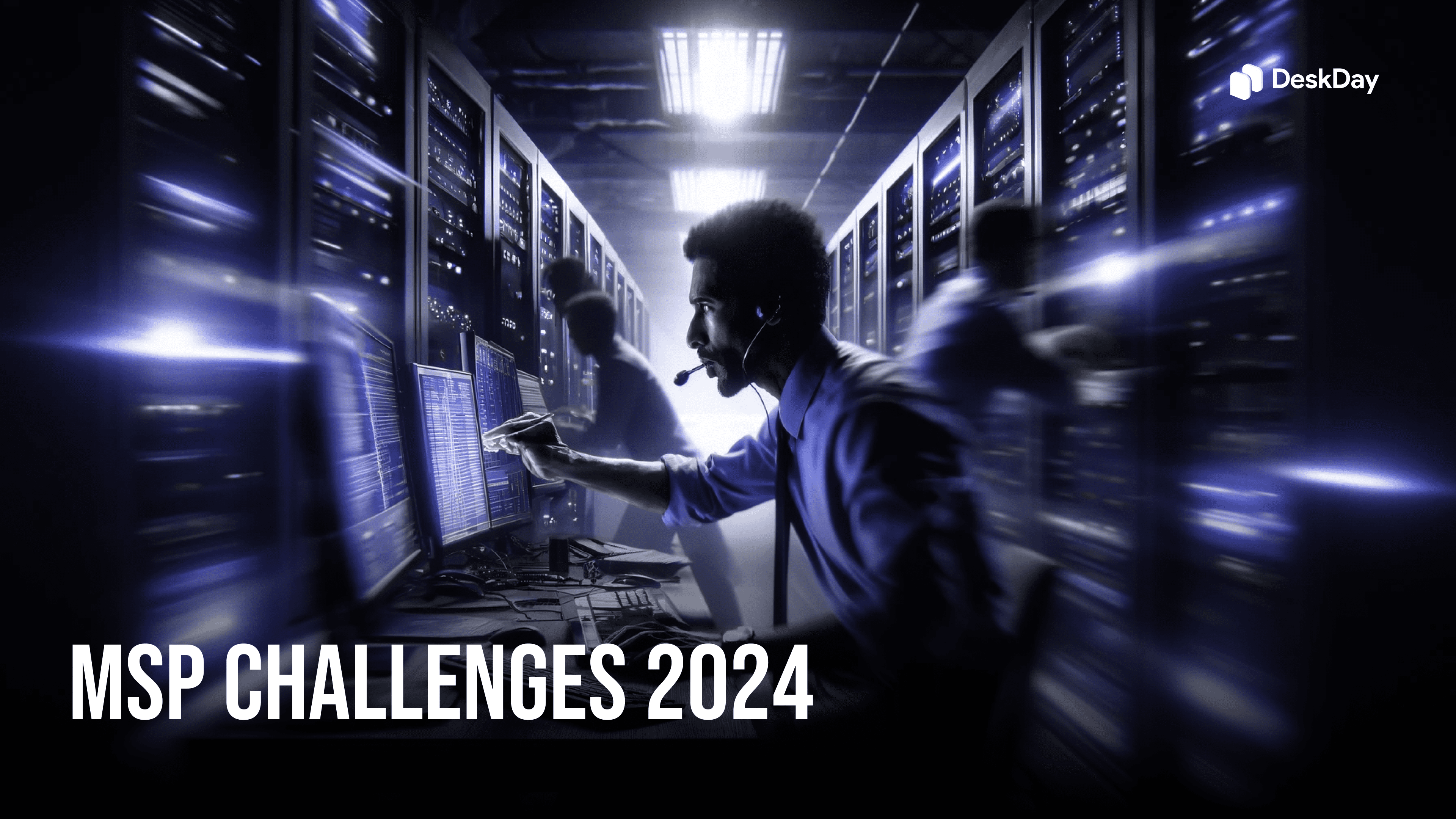Don't leave just yet!
Experience Conversational Service Automation firsthand.
Let's take it for a spin together. 💜
book-a-demoExperience Conversational Service Automation firsthand.
Let's take it for a spin together. 💜
book-a-demo
 Echo
EchoNews and resources from the frontiers of service desks and MSP's curated by DeskDay.
 Back to Echo
Back to Echo

As the second quarter of 2024 draws to a close, Managed Service Providers (MSPs) find themselves at a critical juncture. What plans have MSPs set in motion so far this year? What challenges have surfaced in the journey, and how are MSPs planning to navigate these obstacles as we move into the subsequent quarters of 2024?
Here’s a detailed exploration of the key challenges that we have found to have surfaced so far, drawing from insights across the industry.
By delving into these challenges with a strategic and proactive approach, MSPs can transform potential obstacles into avenues for innovation, growth, and differentiation. Embracing change, investing in technology and people, and focusing on delivering exceptional value to clients will be key drivers of success in the dynamic landscape of 2024 and beyond.
The integration of AI into the toolsets and operational frameworks of MSPs marks a revolutionary shift towards enhanced efficiency and innovation as we sail 2024. A significant portion of MSPs is expected to leverage AI to craft bespoke tools and automate processes, highlighting both the potential for improved service delivery and the challenges of keeping pace with rapid technological advancements.
Developing a strategic plan that includes substantial investment in training and technology is crucial, as is establishing ongoing learning initiatives to keep tech at the forefront of AI developments. These steps ensure MSPs can fully leverage AI’s potential to benefit their clients while navigating its complexities..
The rise in the number of MSPs has intensified competition, leading to a crowded marketplace where differentiation is key. Customers today are more tech-savvy, often engaging in exhaustive cost-benefit analyses that can delay decision-making. MSPs must innovate and add value to stand out, necessitating a deep understanding of changing consumer expectations and behaviors.
With new entrants into the market, Remote Monitoring and Management (RMM) and Professional Services Automation (PSA) tools is undergoing significant evolution, presenting both challenges and opportunities for MSPs. In this context, the strategic selection of tools becomes critical for MSPs to streamline operations and enhance service delivery effectively.
Next-generation PSA tools are specifically designed to meet the modern demands of users, featuring multi-channel support and chat-based service desks, which are essential for providing responsive and adaptable customer support. These advanced systems also incorporate automated quality assurance and the ability to broadcast outages and scheduled updates, ensuring all stakeholders are kept well-informed and that service standards are consistently upheld.
Integrating with customer organizations brings its own set of challenges, particularly regarding cultural alignment. MSPs must ensure their tech can seamlessly blend into customer cultures to avoid costly clashes. Furthermore, the redefined focus on customer experience demands that MSPs prioritize delivering memorable service, shifting the industry landscape significantly.
Traditionally reliant on referrals for business growth, MSPs now face the challenge of diversifying their lead generation and sales conversion strategies. This involves repositioning in the market, offering new services, and investing in product management and marketing to meet and exceed customer expectations.
With the entry of new players offering similar services at lower prices, customer retention has become as crucial as new customer acquisition. MSPs must reinforce their value proposition, focusing on quality and establishing trust through transparent, effective communication and engagement strategies.
Despite these challenges, the MSP sector is forecasted to grow, with areas like cybersecurity management, cloud infrastructure, and AI consulting driving demand.
Over 50% of MSPs are expected to operate within an ecosystem model by 2025, indicating a strategic shift towards collaboration and co-management. Compliance consulting and Managed Detection and Response (MDR) services are predicted to be key growth areas, highlighting the sector’s dynamic nature and the need for MSPs to adapt and evolve continually.
In conclusion, MSPs in 2024 need to navigate a complex landscape marked by rapid technological advancements, changing customer expectations, and intense competition. Success will depend on your ability to adapt, innovate, and maintain a customer-centric focus, turning potential challenges into opportunities for growth and differentiation.